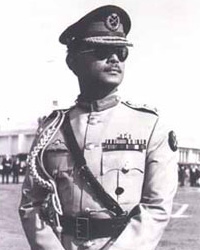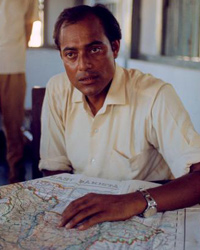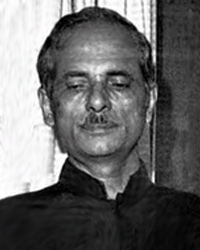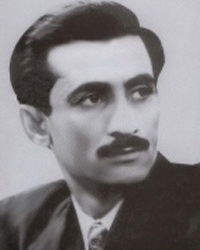
Farook hatches the plan
The Tongi episode which turned Farook
One day during a combing operation in the Tongi area north of Dhaka, Major Nasser who was commanding another squadron of the Bengal Lancers, arrested three small-time thugs. The thugs confessed how they had raped a newly wed bride after killing her husband and the taxi driver who was taking them back home from outskirt of the town. They said police investigation was called off when they found out the ring-leader of their gang was Muzamil, chairman of the Tongi Awami League. Incensed, Major Nasser arrested Muzamil and took him to Dhaka for prosecution. However, Muzamil tried to bribe the Major with 300,000 Tk asking him to not to "make it a public affair" and that the Major would have to let him go "either today or tomorrow so why not take the money?". Nevertheless Major Nasser swore to bring Muzamil to trial and make him hang for his crime. Thus, he was shell shocked when a few days later Muzamil was released on Sheikh Mujib's direct intervention. "I told you to take the money. You would have been the gainers. Now I have been released anyway and you get nothing", Muzamil gloated to Major Nasser.
It seemed as if we were living in a society headed by a criminal organisation. It was as if the Mafia had taken over Bangladesh. We were totally disillusioned. Here was the the head of government abetting murder and other extreme things from which he was supposed to protect us. This was not acceptable. We decided he must go.
I lost my temper. I told Captain Sharful Hussain "Sharful Hussain this is absolutely useless. Let's go and knock off this chap". He said "Yes Sir. But think about it a bit more". I said, "All right, I'll think about it".
That's all I could do, think about Sheikh Mujib and how to kill him. I had my troops with me, the solid hard core who I had myself trained in detail, how to handle weapons, how to shoot, how to ambush, to surprise. Mujib was being guarded by our troops (Lancers) at that time. I thought I should just drive the trucks in and tell the guards, Okay. Relax. Then go inside and shoot him up.
Then I realised that was a very stupid thing. I was not thinking. I was working on emotion. I had not developed that far. That's why I trusted my troops so much. They knew my feelings. They did not betray me.
Do you remember how we wept when we heard that Sheikh Mujib had returned? Remember the whole country, people mad all over! The man was almost made a god! In 1972 if he told us, "Alright you all round up the Awami Leaguers or the Brigade Commanders, tie them up and throw them in the river" we would have done it. Why? Because Sheikh Mujib had said it. What for? Nobody would have asked. I would not have asked. We felt we have got a country, we have got a leader. We were prepared to do anything. We did not mind any problem. Soldiers, men, rank, nothing mattered. It was such an extreme emotion and it was not just one person, but hundreds of thousands of people. All differences had died. That's why it turned so bitter. I say this chap (Mujib) has created the crime of the century by destroying the feeling of such a large number of people.
After that [Tongi incident] I was just not interested in promotion, courses, career or anything. I only thought about one thing - how this government should go.
In Bangladesh at that time there were many others with the same fixation. There was a lot of quiet plotting going on all over, including those such as Mujib's political advisers and ministers who daily fawned at his feet. Politicians used to meet with exaggerated casualness at weddings, funerals and at the mosques after namaz (prayer) on Friday. They were extremely careful in their intrigue. Talk could be dangernous since sycophants among them had the habit of running off to denounce each other. And there were swarms of Mujib's intelligence men. But there was less restraint in the army. The Dalim incident followed by the retirement/dismissal of 22 young officers had not only created resentment against Mujib but had also thoroughly exposed the ineffectiveness of the senior army commanders. Thus with their careers in a mess and no one in the army to stand up to the politicians, the young officers and men could not have cared less about who heard them sounding off.
Farook recalls: "Everyone was fed up. They were all talking about ideologies, coups, counter-coups, Marxism, communism, and the formation of cells. Everywhere there was talk about plots and counter-plots". Mujib's intelligence services faithfully monitored everything. But the Bangabandhu, supremely confident of his ability to deal with the youngsters, dismissed it all as bravado. His main concern was how the commanders behaved - and he had tamed them.
During this period Major Rashid was in India on a 14-month gunnery staff course at Deolali near Mumbai. In his absence, Farook talked to other officers, individually and in small groups to gauge their political views. He held secret meetings with the likes of Col. Amin Ahmed (GI-OPs in army headquarters), Major Hafiz (Brigade Major of 46 Dhaka Brigade), Major Salim of the Artillery, Major Nasir, Major Ghaffar and Squadron Leader Liaquat.
 Liaquat ()
Liaquat ()  Hafiz ()
Hafiz ()  Amin Ahmed ()
Amin Ahmed ()  Salim ()
Salim ()  Nasir ()
Nasir ()  Ghaffar ()
Ghaffar ()
Farook read several dozens books to expand his political knowledge. These books included Che Guevera's Diaries, some writings of Chairman Mao and a thesis on the political problems of South-East Asia. He also read about the Indonesian experiment and the overthrow of Sukarno whose political experiences bore some resemblance to Sheikh Mujib's. It led to him to a crucial and conclusive decision.
I asked myself should Sheikh Mujib be deposed like Sukarno and retired to a palace? I debated the idea for a long time. If we had the whole army or the whole population behind us things would have been different. But there were very few of us. If we took him prisoner, counter-forces would come out in his name and over-run us. I also knew he was depending strongly on India. There was always the possibility that someone would call in the Indians on behalf of Sheikh Mujib or that the Indians would object to Mujib being deposed and send in their armies to support him. Even if he were killed at that stage it would have made no difference because by then Bangladesh would have come under India. This would have defeated my whole purpose. Bangladesh would have been in a bigger soup. I realised that if he was killed nothing would happen in the country, at least there would be no cause for India to wave the flag and come in. In a way Sheikh Mujib signed his own death warrant because of his love affair with India. We could not put him away like Sukarno. I was convinced there was no alternative. Sheikh Mujib had to die.
Mujib had to die because he was more experienced politically and if he lived we would not have been able to control the situation. He would have brought in outside powers, even if it meant a civil war. And he would have turned the tables on us.
Identifying targets
As the days passed Farook began to get restive. The young officers were having endless discussion about ideological matters and planned to establish cells throughout the army. In practical terms, however, they were getting nowhere. Coup by conversation did not appeal to the practical armoured corps officer particularly as Sheikh Mujib was showing signs of strengthening his own position. Mujib's promulgation of the State of Emergency was yet to come. But meanwhile Dhaka was humming with rumours about is plans to change the Constitution and instal himself as President with absolute power, presiding over a one-party state. Without telling the others, Farook quietly began to work on an elaborate operational plan of his own. It was the middle of December 1974, a few days after they had discarded the idea of hijacking Mujib's helicopter.
Farook proceeded in a military manner. First the targets were identified. Who would have to be "neutralised as far as possible, eliminated if necessary?" Who could react against them at the decisive moment?
When I found people not relevant to the problem I would cut, cut, cut.
 Ziaur Rahman ()
Ziaur Rahman ()  Khaled Musharraf ()
Khaled Musharraf ()
When he calculated the number of troops required for each task Farook found he needed a small army.
It was more than brigade strength and I asked myself where the hell am I going to get all these troops?
Farook on the dilemma of recruiting troops required to carry out the mission
He then briefly toyed with a commando-style operation deploying 50 men for a strike on Mujib's house, but discarded the plan as impractical as no blocking operation was planned and the Rakkhi Bahini and other army units would have retaliated smartly. So Farook went back to reducing his operational plan to more manageable proportions.
At the same time he [Farook] took extreme precautions against discovery. He would spend the night drawing charts, making detailed calculations, writing in target assessments and troop requirements. These he would fix in his mind. When morning came every scrap of paper would be scrupulously burnt. "I had my wife, children, father and mother with me in the cantonment. All our lives were at stake. There was no point in taking any chances".
The assessment would prove to be amazingly accurate. After Mujib's assassination, the army commanders, like frightened sheep, fell quickly into line.
So Farook finally narrowed down his list the three people: Sheikh Mujib, his nephew Sheikh Fazlul Huq Moni, and his brother-in-law Abdur Rab Serniabat. They were the men closest to Sheikh Mujib.
Abdur Rab Serniabat was married to Sheikh Mujib's younger sister Amena. He is an elder brother of Sheikh Mujib's wife Fazilatunnesa (i.e. Sheikh Mujib and his sister married into the same family). Serniabat was a former water resources minister and a peasant leader.
Sheikh Fazlul Huq Moni is Sheikh Mujib's elder sister Asia Khatun's son i.e. his baghna (nephew). Sheikh Moni was a former Freedom Fighter, journalist and politician. He was the founding chairman of Bangladesh Awami Jubo League, the youth wing of the AL party. Sheikh Moni was seen as a likely successor to Sheikh Mujib.
 Abdur Rab Serniabat (1921 - 15 Aug 1975) Lawyer and politician. Born in the village of Sarail, Gouranadi upazila, Barisal district.
Abdur Rab Serniabat (1921 - 15 Aug 1975) Lawyer and politician. Born in the village of Sarail, Gouranadi upazila, Barisal district. Sheikh Fazlul Huq Moni (4 Dec 1939 - 15 Aug 1975) Muktijuddha and founder of Bangladesh Awami Jubo League.
Sheikh Fazlul Huq Moni (4 Dec 1939 - 15 Aug 1975) Muktijuddha and founder of Bangladesh Awami Jubo League.
Moni was an extremely shrewd, capable and ruthless politician with a powerful influence in labour and student groups. He was also Editor-in-Chief of the semi-official Bangladesh Times. Serniabat was acquisitive and ambitious. Like Mujib, both hated the army and had strong vested interests in Sheikh Mujib's mantle. They were also part of Bangabandhu's family.
Major Farook decided that these three men should die.
Why Farook decide to kill Sheikh Moni and Abdur Rab Serniabat
Farook goes on spying mission
Farook spent that winter developing his blueprint for attack. Dressed as an ordinary citizen so as not to arouse suspicion, Farook went on a fact-finding mission monitoring Sheikh Mujib to "firmly establish the pattern of his life".
At around 10 o'clock every night that winter when the social set in the fashionable Dhanmondi area of Dhaka settling down to the enjoyment of life, a dark figure would slip out of a rickshaw on the Mymensingh Road, Dhanmondi, and after a short walk past the lake would casually turn into Road No. 32.
There was nothing about the grey-checked lungi, the dark cotton bush-shirt and the well-worn chappals (slippers) to place the sauntering figure apart from the many domestic servants relaxing in the cool air after a hard day's work. The only difference was that while the others were out for a life-sustaining breather, this dark figure was the Angel of Death. Major Farook Rehman was stalking Sheikh Mujib like the Hound of Hell.
I could not trust anyone. I had to check Mujib over personally for a period to see exactly what were his movements, his habits, what he did, where he went. I had to firmly establish the pattern of his life. In the final moment when my troops went into action there was no question of a single slip.
Fortunately for Farook his 1st Bengal Lancers provided the night guard at Sheikh Mujib's three-storey bungalow. Road No. 32 had a triple cordon security system. The outer ring consisted of a police post with armed police placed strategically on both sides of the house. Backing them up were the army sentries who manned the gates and patrolled the inner walls of the small compound. Sheikh Mujib's handpicked personal bodyguard carrying side arms and sten guns sprawled in the ground-floor corridors of the house itself.
Sheikh Mujib would never know what hit him, Farook thought. With his private army, the Rakkhi Bahini, rapidly multiplying, Sheikh Mujib felt he had nothing to fear from the military establishment, least of all from any army major. And he had never even heard of Farook! Very soon the whole of Bangladesh would get to know who he was.
By middle of March 1975 Major Rashid had completed his course in India and hurried back to Dhaka. Having created a solid plan, the two young majors now had one important issue to resolve - who would become the top man after they topple Sheikh Mujib?
